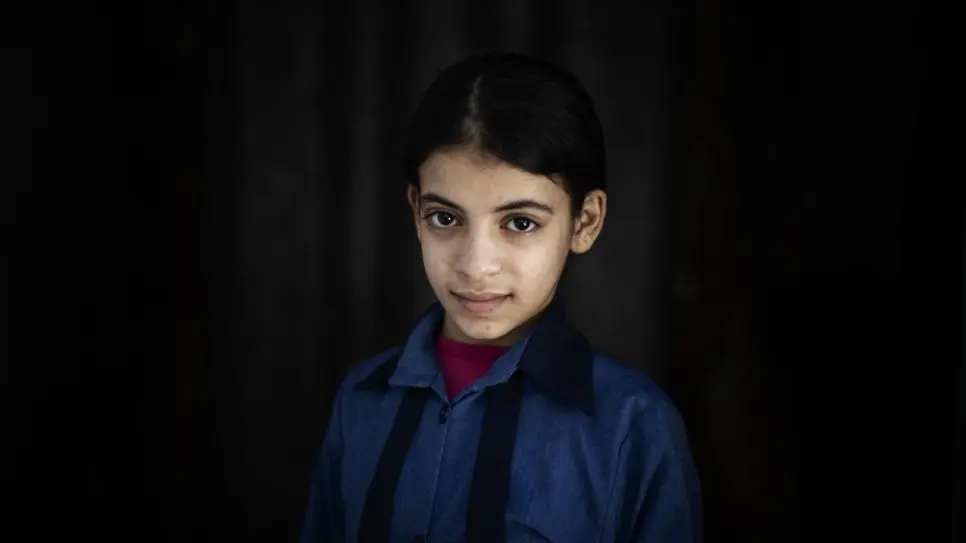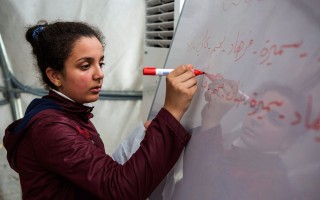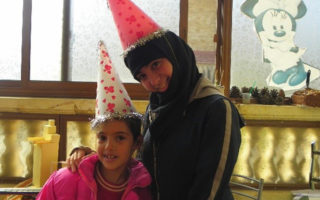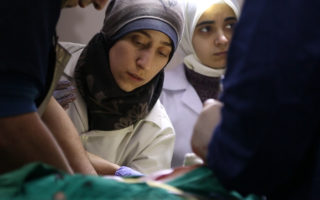
Portrait of Syrian refugee Naamat in Amman, Jordan. © UNHCR/Diego Ibarra Sánchez
Her family’s dire financial straits have led to 11-year-old Naamat taking on many of the household duties, but her resilient spirit has enabled her to excel at school.
By Rima Cherri in Amman, Jordan
Each weekday morning after her mother has left for work, Naamat changes her youngest brother Ibrahim’s diaper and feeds him a bottle of formula milk. She then prepares a simple breakfast of bread, oil and thyme-packed za’atar to share with her two other younger brothers before cleaning up, packing their bags and walking with them to catch the school bus, having dropped Ibrahim off with a neighbour.
“Naamat is only 11, but she’s living the life of a 30-year-old woman,” her mother Fatima says. “It’s because of our situation,” Naamat responds. “I have to support my parents and my brothers. They don’t have anyone else but me.”
This week marks nine years since the start of the conflict in Syria, a stretch of time that weighs heavily on the lives of millions of ordinary Syrians who have seen their loved ones lost, homes destroyed, families uprooted and their lives put on hold. For 11-year-old Naamat, a refugee from Homs living in Jordan, the war has compelled her take on responsibilities well beyond her years.
While Fatima earns 5 Jordanian dinars (US$7) for half-days spent cleaning houses, her husband Mahmoud is unable to work or look after their children due to the lingering physical and psychological effects of his experiences in Syria, leaving Naamat to take on many of the household chores.
Mahmoud was arrested in 2011 after leaving Friday prayers, with Fatima knowing nothing of her husband’s fate. In 2013, she was forced to flee the fighting in Homs with Naamat and her younger brother Fahed, moving first to the southern Syrian province of Deraa before crossing the border into Jordan.
“It was the worst night of my whole life.”
“We walked from sunset until sunrise,” Fatima recalled. “It was the worst night of my whole life. It was dark and we could hear the sound of bullets in the distance. It was very cold and there was snow, and no way of keeping warm.”
Then aged just four, Naamat still remembers the disorientation she felt arriving in Za’atari refugee camp in the north of Jordan with dozens of other Syrian refugees. “I was surprised because I used to live in a house, and we came to live in tents. I was really shocked. We used to feel warm, and suddenly I found myself in a tent and cold.”
Fatima moved with her children to Jordan’s capital Amman. A year or so later and quite out of the blue, she was reunited with her husband. “There was a knock on the door and I found him [standing there]. I had thought he was dead.”
Today, seven years after their arrival in Jordan, they are still barely able to keep their heads above water. The run-down apartment near central Amman that they rent for 100 dinars (US$140) a month is almost entirely devoid of furniture, with mattresses on the floors for seating and sleeping, and rarely more than a day’s worth of food in the kitchen.
The little Fatima earns is nowhere near enough to provide even the basics for her family. But thanks to the 140 dinars (US$197) in monthly cash assistance she receives from UNHCR, the UN Refugee Agency, together with food vouchers from the World Food Programme, she is at least able to cover the rent, keep them fed and pay for the children’s school transport.
It is a similar picture for the majority of the more than 5.5 million registered Syrian refugees living in the region’s major host countries – Turkey, Lebanon, Jordan, Iraq and Egypt.
The share of refugees living below the poverty line exceeds 60 percent in many of these countries, while more than a third of refugee children are out of school. The protracted crisis has also placed a huge strain on the resources of the local communities generously hosting them.
“I will not despair.”
The precarious situation facing millions of refugees after nine years of conflict is what continues to drive cases of early marriage and child labour, and see children like Naamat required take on domestic duties at such a young age.
Yet despite the responsibility placed on her by their situation, and the awareness that it is not a normal state of affairs for an 11-year-old, Naamat’s quiet determination has helped her to excel at school and rise to the top of the class in many subjects.
“I love education a lot, because I feel that it will give me a beautiful future,” she says. “I lost part of my childhood, but I find what remains in education, and in building a future for myself. I did not lose that yet, and I will not despair.”
It is this hope, kept alive by the fact that Jordan has opened its schools and communities to Syrian refugees, that keeps Naamat and her family going. After nine years, host communities continue to show remarkable solidarity.
“You never feel that she is broken.”
For Fatima, seeing the resilience and optimism that Naamat possesses allows her to hope that they will eventually overcome their current situation.
“Life was very tough on me and my family. We faced many challenges: the pain of war and the pain of leaving our loved ones behind, the financial situation, becoming refugees – so many things,” Fatima says. “But she has a very strong personality. You never feel that she is broken or vulnerable.”
That afternoon, after Fatima returns from work to take over the running of the household from her daughter, Naamat goes outside to play with two friends from the neighbourhood.
As they take turns jumping rope, competing to outdo each other, the serious expression that Naamat has worn for most of the day disappears, briefly replaced by a smile of pure joy.
Originally published by UNHCR on 10 March 2020





